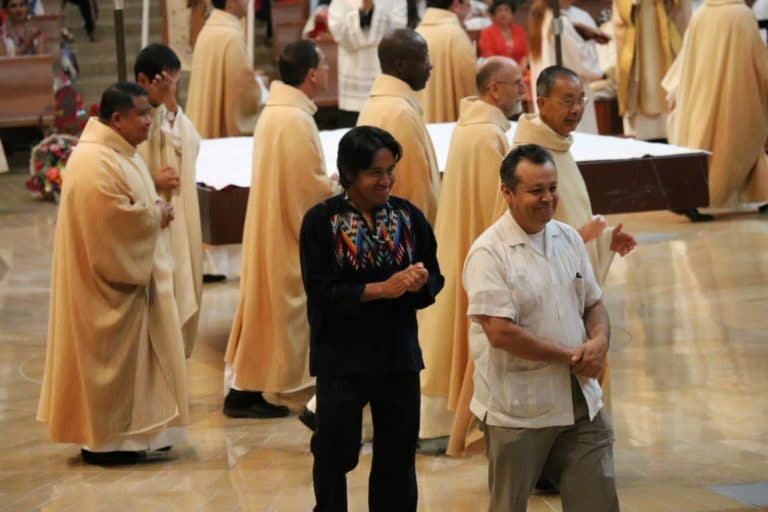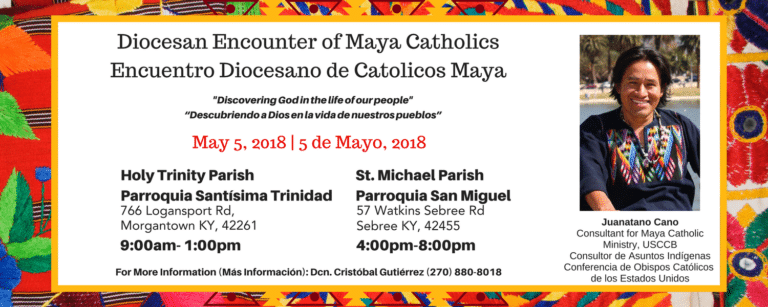
Maya Catholic speaker coming to western Kentucky
BY ELIZABETH WONG BARNSTEAD, THE WESTERN KENTUCKY CATHOLIC
In May 2018, a speaker will come to western Kentucky to address the local population of Maya Catholics – communities who come from southern Mexico and Central America, speak numerous indigenous languages, and descend from native cultures of thousands of years.
“We are different, but one in Christ,” said Juanatano Cano, the national consultant for Maya Catholic Ministry to the U.S. Conference of Catholic Bishops.
Cano, who resides in Los Angeles with his wife and toddler son, is a native speaker of Q’anjob’al, one of many Maya languages.
He explained that “we still speak our languages – there are so many things we keep” from the rich history that stretches across Guatemala and parts of Mexico.
On May 5, Cano will speak to Maya Catholics at a morning session at Holy Trinity Parish in Morgantown, and at an evening session at St. Michael Parish in Sebree.
In a March 9 phone interview with the WKC, Cano said the two gatherings will include “prayer in our native language, and some talks in our native language.”
Cano said there have been “good things” going on in Maya Catholic ministry in recent years.
“We are so blessed that we are being acknowledged, that we are alive and we are here,” he said of growing outreach and evangelization opportunities for Maya Catholics.
Deacon Chris Gutiérrez, director of Hispanic/Latino ministry in the Diocese of Owensboro, invited Cano to speak to the local Maya Catholics and is delighted that Cano accepted the invitation.
Deacon Gutiérrez said there are at least four Mayan languages spoken by Guatemalan Catholics across western Kentucky: Chuj, Q’anjob’al, Mam and K’iche’.
Another indigenous language spoken within the diocese is Mixteco – the language of some Mexican natives – but it is different from both Spanish and the aforementioned Guatemalan languages.
“It is really important to understand that there is a variety of cultures and traditions within one culture,” said Deacon Gutiérrez. “When we’re talking about Latinos, we have to understand that there is a lot of diversity within.”
The deacon said the majority of Maya Catholics live and work in Owensboro, Bowling Green and Henderson among many other local cities.
Deacon Gutiérrez said poverty and a devastated economy in their homelands is driving Maya Catholics to see new opportunities elsewhere, such as migrating to the United States.
“It’s (due to) violence, yes, but also extreme poverty,” he said. “Many times these indigenous communities are oppressed by the government.”
Deacon Gutiérrez added that “nobody wants to leave their homeland – it is out of necessity.”
“It is for the wellbeing of their family that they have to leave,” he said. “It’s a matter of survival.”
Acculturation into the United States can be a struggle for Maya Catholics, especially for young people, said Cano.
He said there is a common “problem with identity” for Maya youth. This sometimes includes not speaking Spanish, which makes it harder to connect with much of the wider Latino community.
Still, Maya Catholics remain hopeful and devoted to their faith.
“Maya Catholics are always involved in the church,” said Cano. “For us, it is not so much ‘What can you give me?’ but ‘How can I help? What can I do?’”
He said a major strength in Mayan culture is “the sense of community.”
“We are just happy to be a part of the Church,” said Cano. ”It is so beautiful.”
Originally printed in the April 2018 issue of The Western Kentucky Catholic.
Copyright © 2018 Diocese of Owensboro/The Western Kentucky Catholic

